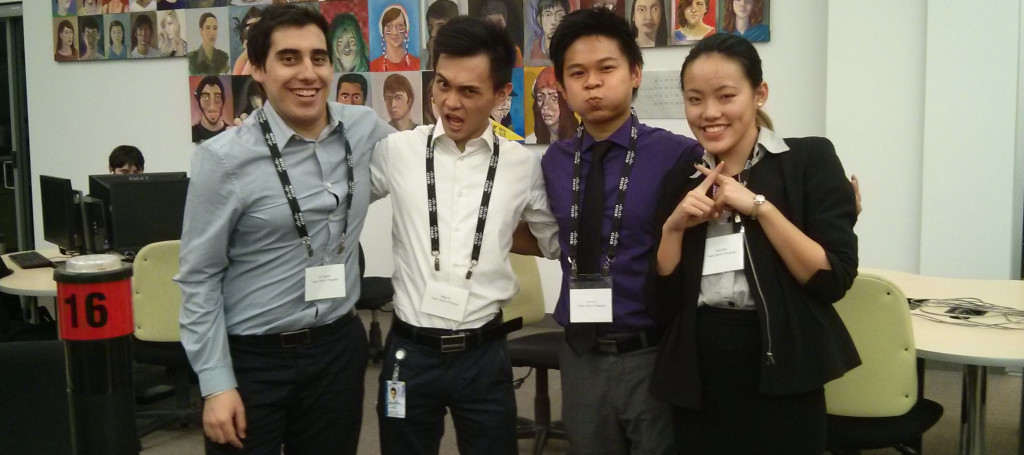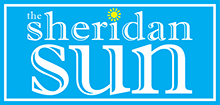Cisco sold on Sheridan students’ proposal

STORY AND PHOTOS BY CHRIS COUTTS
Four Sheridan students were awarded a $10,000 prize and declared the winners of the President’s Innovation Challenge for the Toronto 2015 Pan Am Games.
The event was held on Saturday at Sheridan’s Trafalgar Campus. The winning team, going by the name “Fantastic Four,” is comprised of Interactive Multimedia post-grad students Jason Smith, Chau Le, Leena Salem and Candy Yee Ting Lee. After grouping together for an assignment in their program, they found they all clicked together and entered after one of their instructors informed them of the challenge.
While exhausted and relieved after the more than nine hour long competition, the winners view these types of challenges and competitions as an important part of the post-secondary experience.
“You’re breaking down the walls between students who are at the bottom of the ladder, and people who are, like, who run companies who are at the top,” said Smith.
“You’re able to actually access them, like we were today, and show them that, you know, we do have the skills, there are things we know. We are valuable, you know?” Without venues like these, Smith said, he considers it difficult to get exposure.
Salem also sees these competitions as a valuable way to for large companies such as Cisco to ”get another generation’s perspective” on problems. She also believes that older generations who largely run today’s big technology companies “might not even think to make an app, or to use geolocation or whatever to solve the problem, because they might not even be aware of that solution.”
Fantastic Four’s winning idea focuses on a geo-tracking app that would help connect tourists with locals and experts in an effort to simplify the experience of attending the 2015 Pan Am Games for foreigners and locals alike. The app would be designed to pair up attendees with volunteer “PanAmbassadors,” which are fellow attendees who use the app to designate themselves as proficient or knowledgeable in a certain skill or trait.
The team used the examples of foreign users attending the games and being able to locate users proficient in their native language, or for out-of-towners being able to discover local hidden gems ranging from restaurants to entertainment venues and tourist destinations. They also played up the ease of adaptability beyond the Pan Am games of such a service, highlighting its potential use by all levels of government as well as offering a wide-ranging networking tool for volunteers of all causes.
A $600 People’s Choice prize was also awarded to a separate entry that went to four students in Sheridan’s Interaction Design program. The team, going by the name “Work in Progress,” is comprised of Ali Tayyebi, Riley Co, Deron Li and Kaye Mao.

Their idea, which had only been finalized the night before and after scrapping two others in the days leading up to the competition, was to develop an opinion aggregator by way of a voting app for an attendee’s smartphone. Users would vote on athletes in terms of sportsmanship and all around likability. That data would then be collected and provided to the athletes, to then be exhibited to potential sponsors as a means of quantifying their worth to those sponsors.
Both teams will now have the opportunity to spend the next couple of months using their prize money to help further polish and eventually present their pitches to representatives from the 2015 Toronto Pan Am Games.
Ron Dekker, executive lead on the Toronto 2015 Pan Am Games for Cisco, said that though Canada is “slipping” in terms of leading in innovation, he considers competitions like these an important means of fostering unique ideas outside of typical research and development.
“I think we’re 18th now in terms of overall innovation. Worse, I think we’re still, we’re not a top 10 country in terms of using information technology to change that score,” said Dekker. “We [at Cisco] think that’s a missed opportunity, and one that we’re compelled to continue to reinvest in here in Canada.”
Karin Scott, director of public relations for Cisco, agrees with Dekker’s outlook. “Canadians are smart, and innovative, and have great ideas. I think sometimes there’s a gap between the innovation, and the commercialization [of innovation], which ends up going down the States,” she said.
“Let’s bring that back to Canada. Let’s develop our great ideas here.”
The challenge, put out to all Sheridan students in December, centered on developing an innovative idea for the Toronto 2015 Pan Am Games. It was hosted in partnership with Cisco Systems, Fuse Marketing and software developer Soft Gravity.




